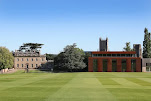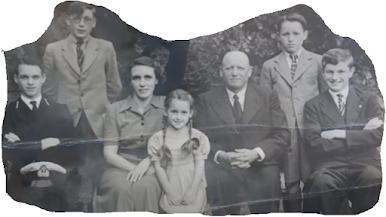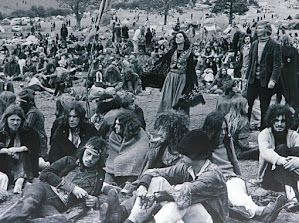Last week the BBC televised 'Glastonbury : 50 Years and Counting' and it was peppered with televised anecdotes from the founder of the Annual Glastonbury Music Festival, eighty seven year old, Michael Eavis.
 Michael was born in the Autumn of 1930 in the village of Pilton in Somerset and in a Methodist chapel was baptised 'Athelstan Joseph Michael', the son of Mary, who was a school teacher and Joseph, who was a Methodist preacher. Michael himself said : "I was born into a good old-fashioned Methodist working-class family. My mother was absolutely brilliant. She was a headmistress and she was a tough character and she made things work in the family. My father was a preacher and ran the farm, and he was more laid-back, although he worked hard too. He was a very likeable chap. Everybody liked Joe Eavis".
Michael was born in the Autumn of 1930 in the village of Pilton in Somerset and in a Methodist chapel was baptised 'Athelstan Joseph Michael', the son of Mary, who was a school teacher and Joseph, who was a Methodist preacher. Michael himself said : "I was born into a good old-fashioned Methodist working-class family. My mother was absolutely brilliant. She was a headmistress and she was a tough character and she made things work in the family. My father was a preacher and ran the farm, and he was more laid-back, although he worked hard too. He was a very likeable chap. Everybody liked Joe Eavis".
Despite his emphasis on family life, in 1944 and during the Second  World War, at the age of 9, he was packed off as a boarder and educated at the Wells Cathedral Public School for Boys. In 2016 when he was seventy-six, he retuned to the school to open its new Cedar Hall with its auditorium names Eavis Hall in his honour. Michael said of his six years at the school : “Most people my age who I met had a different slant on everything and Wells broadened my fields of interest and humour. I learned to laugh about lots of things at Wells. That humour and esoteric view of the world has carried me right through my life. What we did at Glastonbury was unique and we are still ahead of the game. Glastonbury was recently voted the second coolest brand in the UK. Some of that is down to Wells and the satire I learned there".
World War, at the age of 9, he was packed off as a boarder and educated at the Wells Cathedral Public School for Boys. In 2016 when he was seventy-six, he retuned to the school to open its new Cedar Hall with its auditorium names Eavis Hall in his honour. Michael said of his six years at the school : “Most people my age who I met had a different slant on everything and Wells broadened my fields of interest and humour. I learned to laugh about lots of things at Wells. That humour and esoteric view of the world has carried me right through my life. What we did at Glastonbury was unique and we are still ahead of the game. Glastonbury was recently voted the second coolest brand in the UK. Some of that is down to Wells and the satire I learned there".
.png) "Eavis, we haven't got any crew, go and find them." I said : "Where do I go?" and he said : "The brothels and jails." I was only 17. So he gave me all this money and I wandered through the streets of Mombasa with a nice, fairly smart uniform on. A little girl came up to me and flighted her dress up at me and asked : "Would I lie with her ?" I don't know how old she was, probably about 13, so I said : "Thanks very much for the offer, but no thank you. But can you tell me where you would lie?", which of course was the brothel. So she took me into the brothel. They were all in there and I hauled them out".
"Eavis, we haven't got any crew, go and find them." I said : "Where do I go?" and he said : "The brothels and jails." I was only 17. So he gave me all this money and I wandered through the streets of Mombasa with a nice, fairly smart uniform on. A little girl came up to me and flighted her dress up at me and asked : "Would I lie with her ?" I don't know how old she was, probably about 13, so I said : "Thanks very much for the offer, but no thank you. But can you tell me where you would lie?", which of course was the brothel. So she took me into the brothel. They were all in there and I hauled them out".His life at sea only lasted for two years and he said : "When I was 19, my father died of stomach cancer and I had to come home and run the farm. The farm had always been a love of mine. The bank manager said : "Look, are you going to get stuck in because otherwise we'll sell the farm." I said : "No, you can't do that. I'll get stuck in and see what I can do".
.jpg)
 Sixteen years were to pass before the seed of the idea of the farm being used to accommodate an 'al fresco' music festival was planted in 1969 on the day that Michael sneaked through a hedge with his future wife, Jean, to enter the 'Bath Festival of Blues'. (link) He was inspired, in particular, by the performance of Led Zeppelin to host a free festival on his farm the following year. He said : "Something flashes down and you suddenly change. Bit like St Paul; do you know what I mean? There's a change of attitude, a change of purpose". (link)
Sixteen years were to pass before the seed of the idea of the farm being used to accommodate an 'al fresco' music festival was planted in 1969 on the day that Michael sneaked through a hedge with his future wife, Jean, to enter the 'Bath Festival of Blues'. (link) He was inspired, in particular, by the performance of Led Zeppelin to host a free festival on his farm the following year. He said : "Something flashes down and you suddenly change. Bit like St Paul; do you know what I mean? There's a change of attitude, a change of purpose". (link)
Michael recalled : "I'd been into pop music all my life. I started with Pee Wee Hunt, Elvis Presley and Bill Haley but by the late 60s it was Dylan and Van Morrison and I was very anti the Vietnam war. Anyway, I had such a good time at the Bath Blues Festival in 1969 that when I got home I thought, 'We've got a good site here in Pilton. Why don't we do something similar?' The first problem was that I knew nothing about the music business. I started by ringing up the Colston Hall in Bristol to ask how I could get in touch with pop groups. A chap there gave me the name of an agent, and the agent put me in touch with the Kinks, who agreed to appear for £500, which was a lot of money for me to pull out of a milk churn". In addition, there was local opposition and he said : "I knew I was in for a fight, but my background has always been nonconformist. Our whole family down the years have been Quakers, Methodists, very anti-establishment, always looking dubiously at central government".
.jpg) " I regarded the whole event as kind of a cross between a harvest festival and a pop festival, so I had some bales of hay up on the stage and Marc Bolan perched on one of them when he was singing 'Deborah'. Despite my first encounter with him, I have to say that he was wonderful, easily the highlight of the Festival. The sun was going down behind the stage, a red sun. There were only 1,500 people there to see it, but you knew this was music that was going to last. To this day, I reckon it's one of the best things that ever happened here". (link)
" I regarded the whole event as kind of a cross between a harvest festival and a pop festival, so I had some bales of hay up on the stage and Marc Bolan perched on one of them when he was singing 'Deborah'. Despite my first encounter with him, I have to say that he was wonderful, easily the highlight of the Festival. The sun was going down behind the stage, a red sun. There were only 1,500 people there to see it, but you knew this was music that was going to last. To this day, I reckon it's one of the best things that ever happened here". (link)In 1981, the now, properly named 'Glastonbury Festival', gained a political edge as the first Campaign for Nuclear Disarmament Festival and Michael raised around £20,000, which was his first of 10 annual donations to CND. During this decade his Festival lived on a knife edge from year to year. Michael had to fight off district council charges that he had breached licence conditions and one year it was overshadowed by a confrontation between security teams and travellers who were looting the emptying site. This resulted in 235 arrests and £50,000 of damage. However, after a 'gap year', it returned with Tom Jones as surprise guest and now in the post-Cold War, with the threat of nuclear war lifted, Michael donated £250,000 raised to Greenpeace, Oxfam and local causes.
Michael told the New Statesman that his hero in adult life had been the historian, writer, socialist and peace campaigner, E.P. Thompson and : "His speech from the Pyramid Stage in 1983 is still the best speech ever at Glastonbury". The late historian and peace campaigner likened the crowd to a medieval army and argued : “With its tents, all over the fields this has not only been a nation of money-makers and imperialists, it has been a nation of inventors, of writers of activists, artists, theatres and musicians". Looking directly at the assembled crowds he told them : “It is this alternative nation which I can see in front of me now”.
The 1990s, saw the Festival moved into the consumer-savvy age of cash machines, retail outlets, restaurants and flush lavatories. Channel 4 televised it, attendances topped 100,000 and the likes of Oasis, Blur and Robbie Williams headlined. Perhaps the defining image of the Festival for many was fixed in 1997, when torrential rain brought the 'Year of the Mud'.
After recovering from stomach cancer, Michael stood as a parliamentary candidate for the Labour Party in the 1997 General Election and polled over 10,000 votes. He then suggested that disillusioned Labour voters should switch their vote to the Green Party to protest at the Iraq War. In 2009, he was nominated by 'Time Magazine' as one of the 'Top 100 Most Influential People in the World' and in 2010, at the Festival's 40th anniversary, appeared on the main stage with headline artist Stevie Wonder to sing the chorus of "Happy Birthday". (link)
He started the Festival with a £5,000 overdraft and by 2013 it was up to £1.3m and when asked : "Could he pay it off?" he said : "I'd feel guilty if I did. Isn't it funny? Why? We give away £2m a year to Greenpeace, Water Aid, Oxfam, we do local stuff at schools and housing. It's really important to keep that going. I can't just pay off my overdraft and say, 'Sod that".
He still continued to see himself as a farmer first and foremost and easier to reconcile with his Methodism : "Being a farmer is more authentic than organising Glastonbury. You're rearing cattle, you're feeding people. There's no branding, no sales pitch, it's just a natural way of living. There's no contamination, no transport, trains or planes. The festival has got a lot of other stuff – drugs, drinking, branding. It's a different thing. I love the Festival. That's why it's so successful – because I love it so much. But you offered me a preference, and I'm just telling you why I prefer the farm."
In 2013 it was the turn of the Rolling Stones opening with 'Jumpin' Jack Flash', with Mick Jagger prowling the stage in a green sequinned jacket and after 'It's Only Rock 'N' Roll (But I Like It)', joked that the organisers had "finally got round to asking us to play." He then belted out a total of 20 songs on the two hour set. After 'Satisfaction' he said : "We've been doing this for 50 years or something. And if this is the first time you've seen a band, please come again". Michael's comment was : "They finally did it, and it was fantastic. My God, did they deliver." Speaking immediately after the band came off stage, he called it "the high spot of 43 years of Glastonbury".(link)
Michael said :
"I'm a bit of a Puritan, but I do enjoy myself immensely. I have a hell of a good time. I've got the best life anyone could possibly have. I'm not moaning. This whole Festival thing is better than alcohol, better than drugs. It's marvellous".

.png)
.jpg)

.png)

.jpg)


.jpg)

.jpg)
.jpg)
.jpg)
.jpg)
.jpg)
No comments:
Post a Comment